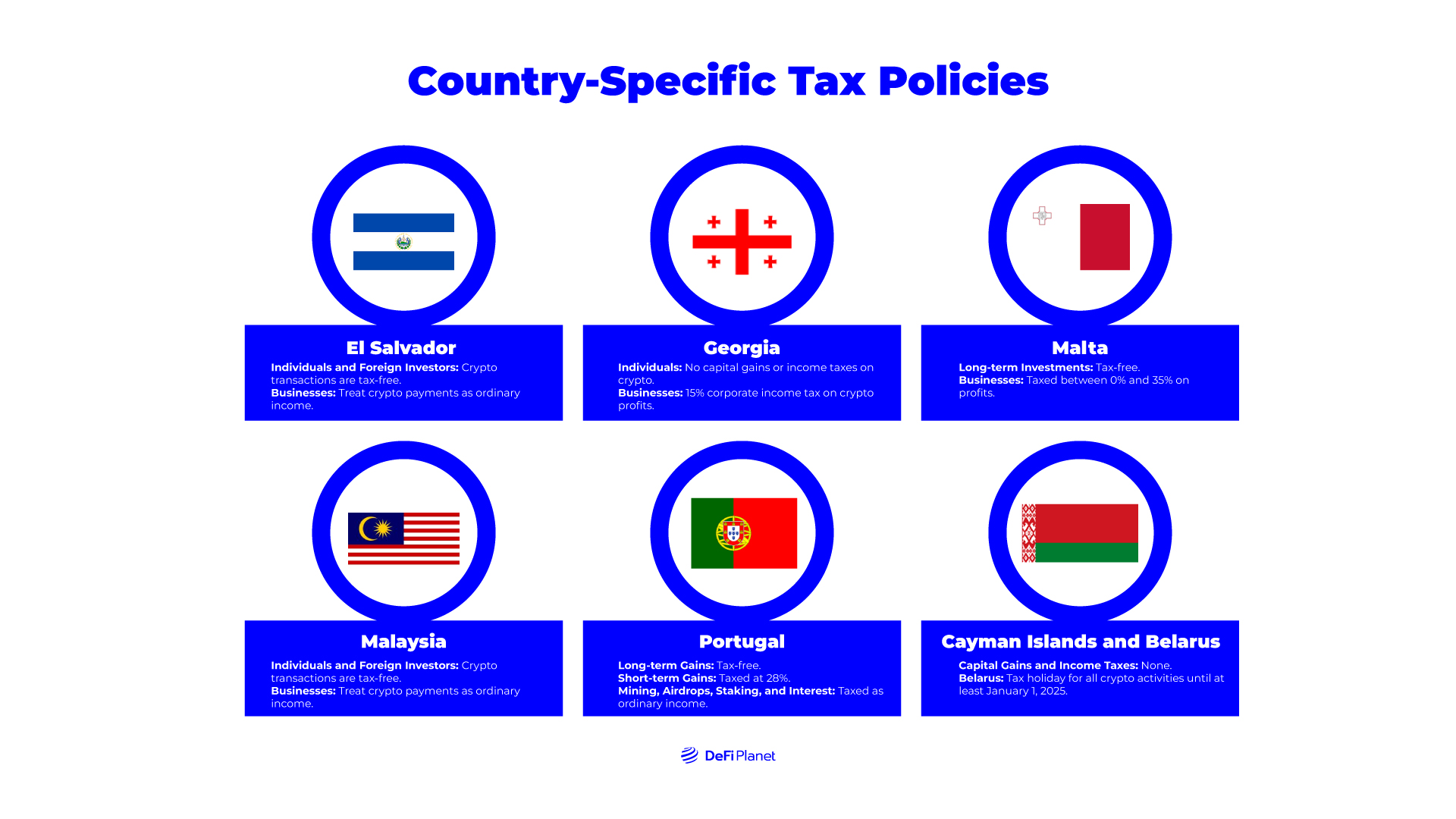Last updated on January 13th, 2025 at 05:20 am
Benjamin Franklin once said, “Nothing is inevitable in life except death and taxes.” This is true for everything, including cryptocurrency. As more people use crypto, countries are figuring out how to regulate and tax it.
Some nations are pretty chill with favourable tax policies, while others are super strict. This article breaks down how different countries handle crypto taxes, making it easy to see where you might want to invest or trade.
Understanding Crypto Tax Policies
Crypto tax rules vary a lot from country to country. Usually, profits from crypto are taxed as capital gains, income, or sometimes both. In most countries, profits from buying and selling cryptocurrencies are taxed as capital gains, similar to stocks. This means investors pay taxes when they sell their crypto and make a profit, not when they buy or hold it. The capital gains tax rates vary depending on several factors:
- Holding Period: How long you held the crypto before selling it.
- Annual Income: Your total yearly income affects your tax rate.
- Profit Amount: The total profit you made from selling crypto.
Your annual income is especially crucial. For example, if you make $500,000 a year from crypto, you’ll likely pay a higher tax rate on your profits compared to someone who makes $50,000 a year, even if both investors make the same profit.
Additionally, some countries tax crypto profits as ordinary income instead of capital gains, affecting the tax rate based on income thresholds. Activities like crypto mining are typically taxed as ordinary income
READ MORE: The Ultimate Guide to DeFi Taxes
Crypto Tax Rules by Country
USA
The USA taxes short-term and long-term crypto gains at different rates. Knowing these rules can help you manage your crypto investments and earnings better.
- Capital Gains Taxes: For short-term gains (less than a year) on crypto, taxes range from 10% to 37%. For example, if you bought $5,000 of crypto in March and sold it for $7,000 in May, you’d pay short-term taxes on the $2,000 profit you made in two months.
Long-term gains (held more than a year) are taxed at rates of 0%, 15%, or 20%. It’s often based on the income amount. For instance, if you bought $5,000 of crypto in March and sold it for $7,000 in May the next year, after holding it for 14 months, you’d pay long-term taxes on the $2,000 profit.
You can lower your taxes by subtracting any losses from your gains. For example, if you lost $500 selling Ethereum after buying it for $5,000 and selling it for $4,500, you can deduct this loss from your $2,000 Bitcoin profit. This means you’d only pay taxes on $1,500.
- Income Taxes: Crypto activities such as mining, payments, airdrops, interest, staking, and NFTs are taxed as regular income, with rates ranging from 10% to 37%. These transactions may face double taxation, both as income and capital gains.
UK
The UK has clear tax rules for crypto, covering capital gains and income. These regulations can help investors and individuals handle their tax liabilities effectively.
- Capital Gains Taxes: If you earn up to £50,270 a year, you’ll pay 10% tax on your gains. Earnings above this threshold are taxed at 20%. Also, there is no tax on the first £6,000 in gains annually.
- Income Taxes: Mining, airdrops, wages paid in crypto, staking rewards, and NFTs are taxed as income, with rates ranging from 20% to 45%. You’ll pay 20% on income up to £37,700, 40% on income between £37,700 and £125,140, and 45% on income above £125,140.
Canada
Canada balances taxing crypto earnings with fairness for investors. These regulations help crypto investors follow Canadian tax laws.
- Capital Gains Taxes: Half of crypto earnings are taxed as capital gains (15% to 33%), while the other half is taxed as regular income. Canada doesn’t change these rates based on how long you held your crypto.
- Income Taxes: Mining, airdrops, staking rewards, and NFTs are treated as income and taxed accordingly. Canada has 5 income tax brackets and the amount you pay in taxes depends on how much you earn, with rates from 15% to 33%.
Germany
Germany offers good tax conditions for long-term crypto holders. They help investors reduce their tax liabilities.
- Capital Gains Taxes: Crypto held for at least one year is tax-free. Staked crypto held for at least 10 years is also tax-free. Crypto held for less than a year is taxed as regular income, with rates from 0% to 45%. The first €600 in gains annually is tax-free.
- Income Taxes: Mining, payments, airdrops, and staking are taxed as income, with rates varying from 0% to 45%.
Switzerland
Switzerland minimizes taxes on crypto gains but has a wealth tax. This benefits long-term investors looking for stability.
- Capital Gains Taxes: Switzerland does not impose capital gains taxes. However, wealth tax applies on cryptocurrencies in each canton, with rates varying by canton.
- Income Taxes: Mining, payments, airdrops, and staking are taxed as income, with federal rates ranging from 0% to 11.5% and cantonal rates can go up to 19%.
France
France’s flat tax rate on crypto gains makes the tax process simple. Knowing these rules helps investors comply and optimize strategies.
- Capital Gains Taxes: There is a flat 30% tax rate on crypto gains, with the first €305 in gains annually being tax-free. Crypto mining activities are taxed at 45%.
- Income Taxes: France does not levy additional income taxes on crypto profits beyond capital gains taxes.
Australia
Australia’s tax system for crypto depends on how long you hold and the activity type. This helps individuals plan their investments.
- Capital Gains Taxes: In Australia, capital gains taxes apply when you sell crypto to make a profit in cash, profit from trading crypto, or use crypto to buy items. If held for less than a year, gains are taxed at your income tax rate; if held for over a year, only half of the gains are taxed.
- Income Taxes: Applies to crypto mining activities (for professional miners), receiving wages in crypto, airdrops, earning staking rewards, and creating/selling NFTs in Australia. Income tax rates range from 0% to 45%.

New Zealand
New Zealand treats crypto gains as regular income instead of capital gains to help investors manage their tax obligations.
- Capital Gains Taxes: New Zealand does not impose capital gains taxes on cryptocurrency gains. Profits from crypto are taxed like income earned from a job or business. Tax rates depend on income, ranging from 10.5% to 39%. Losses can offset gains, and excess losses can be carried forward to future years.
- Income Taxes: Similar to capital gains, income tax in New Zealand applies to mining crypto, receiving wages in crypto, airdrops, earning interest or staking rewards. Tax rates range from 10.5% to 39%.
India
India has clear rules for taxing cryptocurrencies, ensuring all gains and income from crypto activities are included in the tax system. If you trade or earn crypto, it’s important to know the tax rules to stay legal.
- Capital Gains Taxes: In India, capital gains tax applies when you sell crypto for fiat or through exchanges, set at 30% of the profit. Selling more than 50,000 INR worth of crypto incurs an additional 1% tax above that limit. Also, if you lose money on crypto, you can’t use those losses to lower your taxes from gains. It’s important to keep track of your gains and losses to understand what you owe in taxes.
- Income Taxes: Crypto activities like mining, receiving wages in crypto, airdrops, and earning from interest or staking are taxed as regular income. Income tax rates range from 0% to 30% across income brackets.
Singapore
Singapore is great for crypto investors because of its friendly tax policies. The tax system is easy to understand, especially for individuals who aren’t professional traders.
- Capital Gains Taxes: Singapore does not tax capital gains from investments, including cryptocurrencies.
- Income Taxes: Most crypto transactions in Singapore are not taxed as income, except for professional traders or businesses earning crypto as business income. However, an 8% goods and services tax (GST) applies to fees when buying, selling, or converting crypto on centralized exchanges.
Nigeria
Nigeria’s tax system ensures that profits from crypto activities help boost the country’s revenue. Knowing these regulations is important for investors to avoid fines.
- Capital Gains Taxes: Nigeria imposes a 10% capital gains tax on profits made from selling cryptocurrency for cash or using it to purchase goods.
- Income Taxes: Activities such as crypto mining, receiving salary in crypto, and earning from staking are treated as regular income and taxed at rates ranging from 7% to 24%, depending on income bracket.
South Africa
It’s crucial to understand the tax rules for crypto investments in South Africa. Following these guidelines helps investors avoid legal issues and stay compliant.
- Capital Gains Taxes: South Africa taxes crypto investors when they sell for profit, with only 40% of gains subject to tax and losses deductible to reduce taxable amounts. The capital gains tax rate is 18%.
- Income Taxes: Income tax applies to crypto mining, payment in crypto, and earning from staking at rates ranging from 18% to 45%, depending on income.
Brazil
Brazil has specific rules for taxing cryptocurrencies, focusing on both capital gains and income. These regulations make sure crypto profits are taxed properly.
- Capital Gains Taxes: In Brazil, capital gains taxes range from 15% to 22.5% and apply only to crypto sales exceeding R35,000 per month. Profits below this threshold are tax-exempt.
- Income Taxes: Income tax in Brazil applies to mining crypto, receiving wages in crypto, airdrops, and earning from staking. Tax rates range from 7.5% to 27.5%, depending on the income bracket.
Chile
Chile’s tax system ensures that profits from crypto investments are taxed correctly. Staying informed about these tax obligations helps individuals manage their crypto activities.
- Income Taxes: In Chile, all profits from crypto are treated as income and taxed accordingly. Income tax rates range from 0.4% to 35%, depending on the income bracket.
- Losses: Unfortunately, losses from crypto investments cannot be used to offset taxable income in Chile, meaning taxes are based solely on profits.
Country-Specific Crypto Tax Policies
In addition to the countries discussed above, some other countries have special tax policies on cryptocurrencies that deserve a mention.
El Salvador
In El Salvador, the first country to adopt Bitcoin as a legal tender, crypto transactions are completely tax-free for individuals and foreign investors. This policy is aimed at attracting global investors.
For businesses, crypto payments are treated as ordinary income and taxed accordingly. Companies must report their crypto earnings in their financial statements.
Georgia
In recent years, Georgia has become a leading country in adopting cryptocurrencies and blockchain technologies, thanks to its favorable tax policies that attract international investment.
- Individuals: No capital gains or income taxes are applied to crypto transactions, making Georgia an attractive destination for crypto investors.
- Businesses: There is a 15% corporate income tax on profits derived from crypto. Businesses must keep detailed records of all crypto transactions.
Malta
Malta’s tax laws let investors trade and hold crypto without capital gains taxes. Businesses have specific tax rules, which makes it ideal for casual investors and business owners.
- Long-term Investments: Investors can hold crypto assets without worrying about capital gains taxes in Malta because they are tax-free.
- Businesses: Profits made from crypto are taxed between 0% and 35%, depending on specific conditions. The exact tax rate depends on the nature of the business and its structure.
Malaysia
Malaysia has a relaxed tax environment for casual crypto traders. However, frequent traders might face different tax rules.
- Non-professional Investors: No taxes are levied on crypto profits in the Southeast Asian country. This policy is beneficial for casual investors who trade occasionally.
- Frequent Traders: May need to pay income tax on their crypto transactions. The tax rate can vary based on the individual’s overall income.
Portugal
Portugal is known for its crypto-friendly tax policies, making it attractive for long-term investors. Short-term gains and activities like mining and staking are taxed differently.
- Long-term Gains: These are tax-free. Portugal’s favorable tax regime has made it a popular location for crypto enthusiasts.
- Short-term Gains: Taxed at a rate of 28%. Short-term traders need to account for these taxes in their financial planning.
- Mining, Airdrops, Staking, and Interest: These activities are taxed as ordinary income. Individuals involved in these activities must report them in their annual tax returns.
Cayman Islands and Belarus
The Cayman Islands are great for crypto investors because they don’t tax crypto gains or income. Belarus also has good tax rules for businesses and investors in crypto activities.
- Capital Gains and Income Taxes: Neither country imposes these taxes on crypto. This provides a highly favorable environment for crypto investments.
- Belarus: Has a tax holiday for all crypto activities until at least January 1, 2025. This initiative aims to boost the country’s crypto industry.
Additionally, some countries haven’t established clear tax policies for cryptocurrencies, creating uncertainty for investors and traders. These countries include:
- Russia: Despite discussions on regulating cryptocurrencies, there is still no clear tax framework.
- Vietnam: Cryptocurrency transactions are neither recognized nor regulated, making tax obligations unclear.
- Indonesia: Cryptocurrencies are not banned, but the regulations for taxes are still vague.
- Saudi Arabia: Cryptocurrencies are not fully regulated, resulting in unclear tax obligations.
- South Korea: Although there have been moves toward regulation, clear tax policies are still developing.
- Argentina: The tax treatment of cryptocurrencies remains somewhat vague, despite increasing government interest.
- Philippines: Some regulations exist, but the tax policies on cryptocurrencies are still evolving and not fully clear.
The lack of crypto tax clarity in these countries can cause confusion, inconsistent reporting, and potential legal issues. Without clear regulations, individuals and businesses struggle to understand their tax obligations, which can affect local crypto market growth.
Final Thoughts
It’s important for crypto investors to understand their tax duties worldwide. In most countries, tax policies differ and you have to pay taxes on any gains from crypto. If you don’t, you could end up owing back-taxes and fines.
To handle all these rules well, it’s smart for crypto investors to visit official websites for first-hand information or use tax softwares. It’ll help you follow all the reporting rules and even help you find ways to pay no more tax than necessary.
Disclaimer: This article is intended solely for informational purposes and should not be considered trading or investment advice. Nothing herein should be construed as financial, legal, or tax advice. Trading or investing in cryptocurrencies carries a considerable risk of financial loss. Always conduct due diligence.
If you would like to read more articles (news reports, market analyses) like this, visit DeFi Planet and follow us on Twitter, LinkedIn, Facebook, Instagram, and CoinMarketCap Community.
“Take control of your crypto portfolio with MARKETS PRO, DeFi Planet’s suite of analytics tools.”























